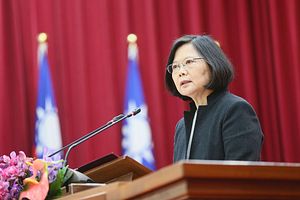Polling companies in Taiwan are making calls to landlines and cell phones to determine whether President Tsai Ing-wen will see off an unprecedented primary challenge from her former premier, William Lai.
A public opinion poll began on Tuesday to ask 15,000 voters, regardless of party affiliation, to choose the presidential nominee of the ruling Democratic Progressive Party (DPP) by indicating their preferences in hypothetical head-to-head matchups with two leading opposition candidates, Kaohsiung Mayor Han Kuo-yu of the Kuomintang (KMT) and independent Taipei Mayor Ko Wen-je.
A party official said Tuesday the result of the poll is expected to be announced on Thursday afternoon.
Tsai, who is in her first term as president, announced she would seek a second term during a February interview with CNN. However, her campaign was thrown into disarray when Lai, who served as her premier until his resignation in January, surprisingly announced his entry into the race.
Tsai has since pushed to consolidate support within the DPP, which threatened to divide into traditional factions upon Lai’s entry into the race. Unlike Tsai, who has maintained a cautious and pragmatic approach toward cross-strait relations with Beijing, Lai has called himself a “political worker for Taiwan independence” and has pushed for a stronger assertion of Taiwanese sovereignty.
The two candidates gave speeches and answered questions in a Saturday TV debate, which ultimately did little to clarify the policy differences between Tsai and Lai.
In his opening speech, Lai urged voters to “pass the baton” of the presidency, saying the party’s crushing defeat in last year’s regional elections was a sign the DPP needed fresh leadership. The former premier pledged to ensure Taiwan retains its position in the “first island chain,” calling for military exchanges with the United States to safeguard Taiwan’s sovereignty.
Tsai touted her administration’s track record of expanding Taiwan’s position in the international sphere. She explicitly cited Taiwan’s closeness with the United States under her watch, noting that a representative office in Taiwan was recently renamed the Taiwan Council for U.S. Affairs. (It was formerly named the Coordination Council for North American Affairs, a moniker lacking references to both “Taiwan” and “the U.S.”)
Tsai’s domestic popularity has suffered over the past year. The president saw her approval ratings drop when she pushed through an unpopular pension reform measure last year. Her administration has also been criticized for a perceived tepid response to stimulating Taiwan’s sluggish economy.
Lai was the premier charged with overseeing this turbulent time in Tsai’s administration, but began to publicly distance himself from Tsai shortly after the party’s regional election losses. Tsai took a subtle jab at Lai’s premiership on Saturday, noting the progress her administration has made under Lai’s replacement, Su Tseng-chang.
Saturday’s debate, however, disappointed viewers hoping for sparks to fly between the two candidates. Both candidates spoke of similar policy goals: rejecting Beijing’s “one country, two systems” formula of governance for Taiwan, creating opportunities for young people and entrepreneurs, and boosting the country’s national defense. (Last week, U.S. officials announced plans to sell over US$2 billion in weapons to Taiwan.)
Instead, the candidates differentiated themselves by their personal roles in defining Taiwan’s political moment. Tsai likened her administration to a construction project in progress and on schedule. Lai, conversely, positioned himself as the next runner in a “relay race.”
After Lai entered the race in March, Tsai maneuvered to push back the date of the primary poll. The strategy likely bought Tsai more time while also allowing the DPP to decide how to carry out its primary. Until this year, a sitting president in Taiwan has never faced a primary challenge from a member of their own party.
Lai’s entry caught much of the DPP off guard, as Lai reportedly did not consult with leaders of his own DPP faction, which favors taking a stronger stance toward securing Taiwan’s sovereignty. Tsai had successfully seen off a January challenge to her authority by senior DPP figures aligned with the party’s pro-independence camp.
Lai has maintained a steady lead over Tsai in opinion polls, but the delay in holding the primary – which was originally scheduled for late March or early April – has allowed Tsai time to consolidate the support of national and local leaders and make a renewed pitch to voters. Tsai has notably taken steps to connect with voters in Taiwan, which she acknowledged as a personal weakness after her party’s election losses last year.
Thursday’s result will have a significant impact on the country’s stability. Should Lai win, Taiwan’s relations with the United States and other nations will be thrown into question; the former premier remains an unknown commodity in the international sphere. If Tsai resists the challenge, she will carry the party’s baton into a January 2020 general election she is currently projected to lose – and will have just over seven months to close the gap.
































